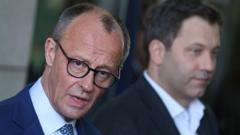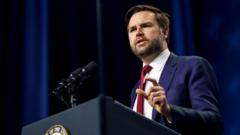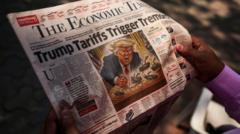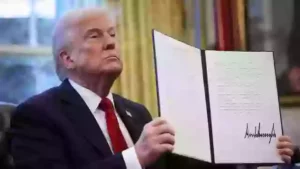In an ambitious move following months of political uncertainty, Germany’s conservatives have formed a coalition with the Social Democrats, signaling a renewed effort to stabilize the country’s governance and economy.
Germany's Conservatives Forge Alliance with Social Democrats to Revive Leadership

Germany's Conservatives Forge Alliance with Social Democrats to Revive Leadership
New government coalition aims to strengthen Germany's economy and military while addressing migration concerns.
Germany's political landscape is shifting as Friedrich Merz, the leader of the Christian Democrats (CDU), announces a coalition deal with the Social Democrats (SPD) to lead the nation after the previous government fell apart five months ago. This agreement is seen as a crucial response to the challenges facing Germany, including an economic recession exacerbated by trade tensions initiated by former US President Donald Trump.
Merz, 69, emphasized that the coalition aims to project a "strong and clear signal" to both the German populace and the European Union (EU), insisting that they are prepared to form a robust government capable of addressing pressing issues. He noted that the previous administration’s challenges have created a backdrop where swift and dynamic government action is necessary.
Germany's economic struggles have been compounded by taxation and the ongoing impact of international trade tariffs. Merz’s comments highlighted a commitment to improving the nation’s economic competitiveness while invigorating defense initiatives and enhancing military readiness. “Germany is back on track” was the message he conveyed, attempting to reassure both domestic and international audiences.
The newly formed coalition comes in response to rising pressures from populist parties such as the far-right Alternative for Germany (AfD), which has gained traction in opinion polls. In recent surveys, the AfD outpaced the CDU, prompting Merz to reaffirm his dedication to stabilizing public confidence through this coalition.
Plans included in the coalition agreement focus on reorganizing migration policies and increasing investments into the military, amid reports of shortages within Germany’s armed forces. Merz has pledged to follow a "Swedish model" of voluntary military service to help rejuvenate the Bundeswehr, Germany’s military establishment.
Despite the urgency of reforms, certain left-wing critics argue that the coalition lacks sufficient plans to tackle the economic crisis. One prominent leftist figure highlighted that Germany risks enduring prolonged economic hardship, dubbing the situation "Merzession," in reference to the new chancellor-in-waiting.
As the coalition awaits parliamentary approval, Merz expressed confidence in a smooth transition, with the new government expected to commence operations by early May. Polls indicate that the CDU retains significant support despite challenges, as it embarks on this new chapter in German politics.
Merz, 69, emphasized that the coalition aims to project a "strong and clear signal" to both the German populace and the European Union (EU), insisting that they are prepared to form a robust government capable of addressing pressing issues. He noted that the previous administration’s challenges have created a backdrop where swift and dynamic government action is necessary.
Germany's economic struggles have been compounded by taxation and the ongoing impact of international trade tariffs. Merz’s comments highlighted a commitment to improving the nation’s economic competitiveness while invigorating defense initiatives and enhancing military readiness. “Germany is back on track” was the message he conveyed, attempting to reassure both domestic and international audiences.
The newly formed coalition comes in response to rising pressures from populist parties such as the far-right Alternative for Germany (AfD), which has gained traction in opinion polls. In recent surveys, the AfD outpaced the CDU, prompting Merz to reaffirm his dedication to stabilizing public confidence through this coalition.
Plans included in the coalition agreement focus on reorganizing migration policies and increasing investments into the military, amid reports of shortages within Germany’s armed forces. Merz has pledged to follow a "Swedish model" of voluntary military service to help rejuvenate the Bundeswehr, Germany’s military establishment.
Despite the urgency of reforms, certain left-wing critics argue that the coalition lacks sufficient plans to tackle the economic crisis. One prominent leftist figure highlighted that Germany risks enduring prolonged economic hardship, dubbing the situation "Merzession," in reference to the new chancellor-in-waiting.
As the coalition awaits parliamentary approval, Merz expressed confidence in a smooth transition, with the new government expected to commence operations by early May. Polls indicate that the CDU retains significant support despite challenges, as it embarks on this new chapter in German politics.




















